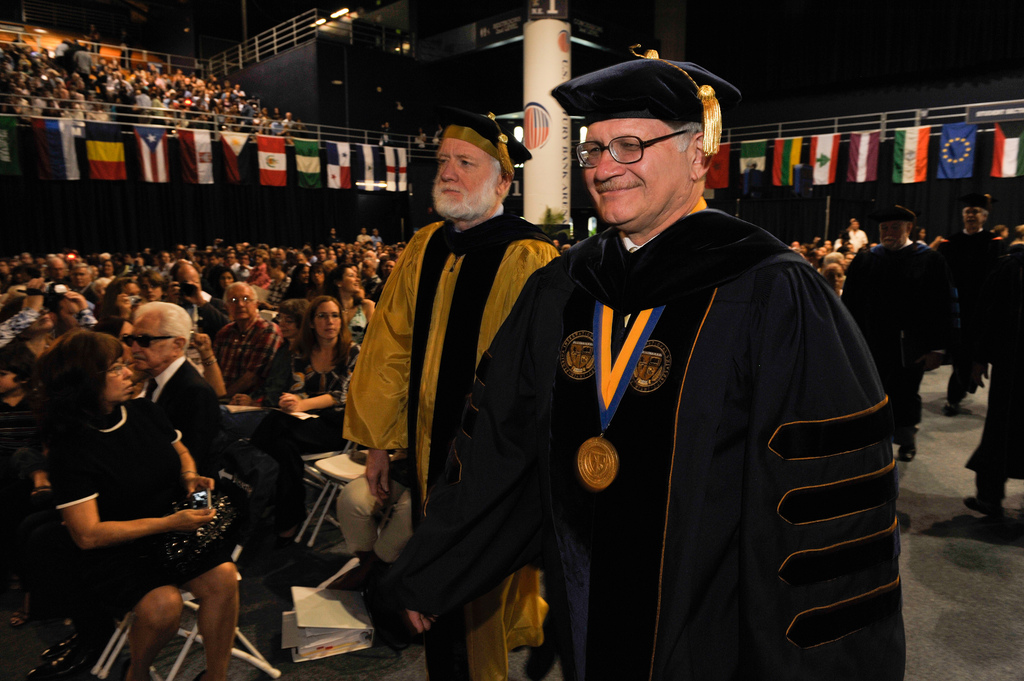By: Nicole Stone/Assistant News Director
The future of computing goes far beyond the next Macbook, according to an associate physics professor.
“We are on the verge of a second quantum mechanic revolution,” said Hebin Li, head researcher of the Li Research Group at the University.
Quantum information processing, the focus of Li’s research, is powered by quantum materials, or particles, unlike conventional computers which rely on transistors, and can compute information in an unprecedented way. According to Li, quantum computers are capable of doing things traditional computers are not good at.
“As an analogy, if you are in a really big hotel and you want to find one person in that hotel, classical computers, will just check each room one by one until you find that person,” Li said. “A quantum computer can search all of the rooms at the same time instead of going one room at a time.”
While computers are very good at this tried but true and methodical way of doing things, a quantum computer may think a little outside the box – or rather, a little inside all the boxes.
Li said that this is one of the aspects of quantum computing that can lead to increased optimization when conducting searches, which also has implications for artificial intelligence, or AI.
Undergraduate students have taken part in Li’s lab in the past, and Li is currently looking for some undergraduate help.
“We are always open to Undergrad students,” Li said. “We have about 20 undergrad students that have gone through our lab within the last five years. Some of them benefited greatly from this experience [joining the Li Research Group].”
According to Li, several of those undergrads have gone on to renowned graduate programs for physics, like the University of Michigan, Cornell, and Florida State University. Others have become research scientists.
While approaching a professor and asking to work in their lab may seem intimidating, Li says that students should be doing exactly that.
“I really encourage undergrad students to talk to professors as much as possible. I know some professors may seem to be really frightening to students – when I was a student, I was also afraid of professors – but when I became one, I realized that you don’t need to be afraid of them,” Li said. “We want to help in any way we can.”
While this may be the case, Li continued, students must be proactive in finding opportunities with professors.
“One thing professors won’t do is knock on your door… so the students need to be proactive on their end. But once you come to my office, I will try to help you as much as I can,” Li said.
For Li, what is important overall is that students stay open minded and inquisitive about our world, regardless of which area of science that curiosity lands them in.
“As member of the department of physics and a member of the scientific community, I cannot stress enough the importance of science,” Li said. “If you think about it, our lives, all the convenience you are enjoying right now, and advances in medicine, are based in science.”
Quantum computing specifically, has many applications according to Li, including secure communication.
“Right now, internet security is based on the fact that we cannot factor a really big number quickly, which quantum computers can do,” Li explained.
Quantum communication, Li said, is much more secure because it is based on something much more complicated: a particle’s quantum state.
“If you send a message from A to B quantum mechanically, it will be completely secure because you can’t copy a quantum mechanic state. So if you listen to the message I’m sending you, then I will know because your action will actually change the information I’m sending,” Li said.
The advancement of detecting abilities in medicine is inevitable as well, according to him.
“The sensor that you use to detect the waves produced by your brain,” Li said, referring to an electroencephalogram. “Those sensors can be much more sensitive.”
IBM and Google already have quantum computers, but according to Li, they do not have the processing power that true quantum computers should have. He and his research team at FIU are studying methods to construct more efficient computers, rather than building their own.
“If you want to make a practical quantum computer, you need a lot more processing units than what Google and IBM have. Then, what’s the best material for that? We are working on this problem,” Li said.
When Li came to the University, he was provided with a “start-up” package to set up his lab. Included was basic equipment and a room. Currently, Li’s work is being funded by two federal agencies, the National Science Foundation and the Department of Defense.
Equipment for examining materials in Li’s Lab actually includes special lasers, which emit ultrashot bursts of light lasting only 100 quadrillionth or 100 millionth of one billionth of a second – in other words, faster than one can imagine.
“Our main tool is lasers,” Li said. “We use lasers to study the quantum mechanic properties of materials and manipulate the materials.”
Optimal quantum computing construction is not the only answer being sought in Li’s research lab, the group is actually working on other projects as well.
For more information on the Li Research Group and their work, students can visit http://faculty.fiu.edu/~hebli/.






Thanks for posting this piece. Would not have known about FIU’s quantum computing efforts. Have linked to this piece thru our worksite, qubitreport[.]com.